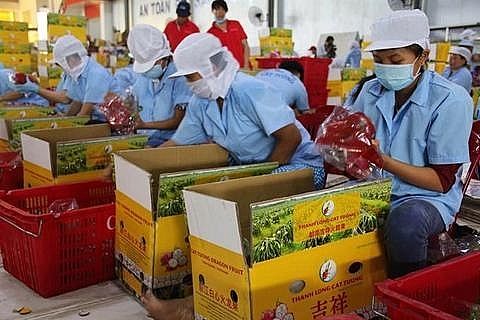E-commerce key for farm exporters
 |
| Dragon fruit is processed at Cat Tuong Agriculture Processing and Production Company Limited in Tien Giang Province. -VNA/VNS Photo Minh Tri |
Wen Xi Chen, economic counselor at the Chinese Consulate General in the city, said Vietnamese enterprises should cooperate with well-known Chinese e-commerce enterprises to open online stores of high-quality farm produce for export to China.
While e-commerce has narrowed the production and consumption gap, and extended consumer markets, traditional sale channels have not updated market information regularly, he said.
To develop e-commerce for agricultural products, logistics service, traceability and human resources should ensure product quality, he added.
Nguyen Hoang Anh, member of the Advisory Council for Reform, who is also vice president of the Digital Agriculture Association (DAA) Viet Nam, said China remained a major market for agricultural products exported from Viet Nam due to similarity of cuisine, culture and geographical proximity.
In 2017, China accounted for 76 per cent of US$3.5 billion worth of fruit and vegetables exports to the country.
“Cuisine plays a major role in the life of Chinese, who like eating, know how to eat, and eat well,” Chen said.
China in recent years has become the world’s largest importer of agricultural products, accounting for one-tenth of global trade in agricultural products, with an annual average import growth rate of 8.8 per cent.
Experts agreed that Vietnamese enterprises need to pay attention to consumer habits and preferences of the Chinese, and expand sales in this huge market.
However, exports of agricultural products to the Chinese market has become tougher due to higher quality requirements.
Exports have been unstable, mostly based on unofficial channels of MSMEs (micro- and small- and medium-sized enterprises) without attention to traceability and branding of the products.
In addition, exports are often stuck at border gates, causing prices to fall.
Cooperation between the two sides has not been as effective as expected, as enterprises from both countries have not kept their contracts.
In addition, agricultural production in Viet Nam has small scale with unstable product quality and low competitiveness.
Vietnamese exporters have not exploited the market, with most Chinese dealers having to visit Viet Nam to source products.
Viet Nam also lacks long-term strategies for building brand names, while Chinese consumers, especially in big cities, do not have a deep impression of Viet Nam’s agricultural products.
“Vietnamese assume China is a densely populated country and that consumers are not demanding of product quality. The reality is their demand has increased significantly,” Chen said.
Vu Tien Hung, head of the Viet Nam Trade Promotion Office in Hangzhou, China, said, “Most Vietnamese farm produce exporters lack information about the Chinese market, but few businesses look to the trade offices to seek information, even though it’s provided for free.”
To fully exploit the market, Chen said State agencies must study the market and grasp the development trends.
They should disseminate agricultural policy guidelines for exporters with more attention being paid to market demand.
In addition, agencies should work with agencies such as customs and quarantine authorities of the concerned countries to create favourable conditions for Vietnamese exporters.
The role of financial and credit institutions in sharing risks with farmers in production must also be emphasised.
Advanced processing technology should be used in production as well.
Nguyen Quoc Toan, director of the Department of Agro-product Processing and Market Development under the Ministry of Agriculture and Rural Development, said to boost exports to China, Vietnamese exporters must meet new standards, requirements, and consumer tastes of the market.
They should also focus on packaging and processing to increase added value for the products.
Exports must be promoted via the main official channels, requiring Viet Nam and China to improve bilateral trade policies for mutual benefit.
There should be close coordination between ministries, embassies, and trade counselors in updating market information and removing obstacles for Vietnamese exporters between the two countries.
What the stars mean:
★ Poor ★ ★ Promising ★★★ Good ★★★★ Very good ★★★★★ Exceptional
 Tag:
Tag:
Related Contents
Latest News
More News
- State corporations poised to drive 2026 growth (February 03, 2026 | 13:58)
- Why high-tech talent will define Vietnam’s growth (February 02, 2026 | 10:47)
- FMCG resilience amid varying storms (February 02, 2026 | 10:00)
- Customs reforms strengthen business confidence, support trade growth (February 01, 2026 | 08:20)
- Vietnam and US to launch sixth trade negotiation round (January 30, 2026 | 15:19)
- Digital publishing emerges as key growth driver in Vietnam (January 30, 2026 | 10:59)
- EVN signs key contract for Tri An hydropower expansion (January 30, 2026 | 10:57)
- Vietnam to lead trade growth in ASEAN (January 29, 2026 | 15:08)
- Carlsberg Vietnam delivers Lunar New Year support in central region (January 28, 2026 | 17:19)
- TikTok penalised $35,000 in Vietnam for consumer protection violations (January 28, 2026 | 17:15)






















 Mobile Version
Mobile Version